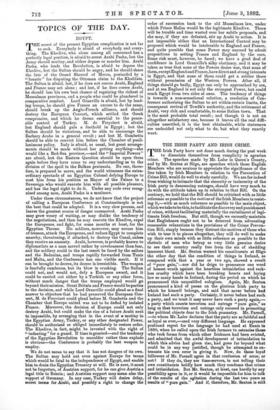THE IRISH PARTY AND IRISH CRIME.
THE Irish Party have not done much during the past week to dissociate themselves from complicity in agrarian crime. The speeches made by Mr. Lalor in Queen's County,. and by Mr. Sexton at Sligo, are speeches which those English Members who are anxious to appreciate the significance of the line taken by Irish Members in relation to the Prevention of Crime Bill, would do well to study carefully. We are far indeed from wishing to intimate that the sincerity or insincerity of the Irish party in denouncing outrages, should have very much to do with the attitude taken up in relation to that Bill. On the contrary, we hold that the Bill should be criticised with as little reference as possible to the motives of the Irish Members in resist- ing it,—with as much reference as possible to the main object, which we take to be this, to facilitate the discovery and punishment of crime, without facilitating materially the curtailment of legi- timate Irish freedom. But still, though we earnestly maintain that Englishmen ought not to be deterred from advocating reasonable relaxations in the provisions of the Crime Preven- tion Bill, simply because they distrust the motives of those who wish to tear it to pieces altogether, they will do well to make up their own minds with as little reference as possible to the rhetoric of men who betray so very little genuine desire to see their country really free from the sin of shedding innocent blood. Mr. Sexton warned his constituents at Sligo, the other day that the condition of things in Ireland, as compared with that a year or two ago, showed a result of " pure gain,"—nor did he deign to pronounce one word of honest wrath against the heartless intimidation and reck- less cruelty which have been breaking hearts and laying low so many heads in Ireland, during the period on which he pronounced this unqualified eulogium. Again, Mr. Sexton pronounced a kind of paean on the glorious Irish party to which he himself belongs, and said that never before had Ireland had such a party. Certainly, it never before had such a party, and we trust it may never have such a party again,— a party which counts terrorism and outrage " pure gain," so long as that terrorism and outrage only succeed in promoting the political objects dear to the Irish peasantry. Mr. Parnell, —to whom Mr. Lalor declares that the party are as faithful and as loyal as ever,—used very different language, He expressed profound regret for the language he had used at Ennis in 1880, when he called upon the Irish farmers to ostracise those who took farms from which other Irishmen had been evicted, and admitted that the awful development of intimidation to which this advice had given rise, had gone far beyond what could be in any way justified, though he attempted to ex- tenuate his own error in giving it. Now, do these loyal followers of Mr. Parnell agree in that confession of error, or not ? If they do, they are time-servers, in not telling their own constituents boldly how much they condemn that crime and intimidation. But Mr. Sexton, at least, can hardly by any possibility agree in it, or it would be impossible for him to talk of the results of the agitation daring the last two years as results of " pure gain." And if, therefore, Mr. Sexton is still
loyal to Mr. Parnell, it can only be because he does not sup- pose that Mr. Parnell believed what he said. In any case, therefore, this glorious Irish party, on whose unity he so much congratulates himself, is either double-faced, or divided against itself. If Mr. Parnell is no longer its real mouth- piece, it is divided against itself, and contains a section which glories in the history of violence and crime which Mr. Parnell deplores. If Mr. Parnell still is its acknowledged and ad- mired leader, then the party must be double-faced, and anxious to get the credit in England of a moderation which in Ireland it entirely ignores. Whichever explanation be the true one, we cannot congratulate the party on its position and its achievements. If it be divided against itself on the sub- ject of terrorism, part of it is weak, and the other part dis- posed to countenance wickedness. If it is united in favour of terrorism, it has accomplished much more in the way of pro- moting the moral degeneration of Ireland, than it has accom- plished, or ever can accomplish, in the way of promoting the agrarian reform and the political independence of Ireland. Hence we say to the English Liberals who are labouring so wisely and so patriotically to get some of the most stringent pro- visions of the Prevention of Crime Bill relaxed, that they should remit nothing of their earnestness, but that they should judge each question that comes before them on its own merits, without paying too much attention to the rhetorical language of a party one of whose most trusted leaders thinks that the result of all that has happened in Ireland, including, of course, outrage and assassination, during the last two years, is one of " pure gain."
Applying these remarks to the debate of Thursday night, we should say that while we fully sympathise with Mr. Horace Davey and Mr. Bryce, and those of the English Liberals who urged that the offences of treason and treason-felony should still be tried by juries, and not be submitted to a Special Judicial Commission without a jury, it is, in our opinion, pure rhodomontade to speak of this clause as the turn- ing-point of the Bill. The very point of Mr. Davey's argument against this clause is that trials for treason and treason-felony have lately been so rare, that it is not needful to supply a special tribunal in order to prevent the failure of justice in relation to them. That argument has been taken up by almost every Irish Member who spoke on the subject. And yet some of these Members talked of this clause as the turning-point of the Bill, and Mr. Parnell himself said that if the Government persisted in it, they would have crossed the Rubicon and burnt their ships, or in some sense have irretrievably committed themselves to a course certain to render the moral attitude of Ireland hopelessly bitter. Well, we simply do not believe that the inclusion in the provisions for a trial without jury of a crime for which there has been hardly any prosecution for the last ten years, will have that effect. We quite agree that it is better to leave treason and treason-felony to juries, as before. Treason and treason-felony—without murder or other aggravations—are purely political crimes, and England is quite strong enough to leave purely political crimes to the operation of the ordinary law, even though that did result in occasional acquittals against the evidence. It is far better, in our opinion, that in the case of political crimes there should be a certain failure of justice on the side of acquittal, than the least danger of the failure of justice on the side of con- viction. Even if,—as we should expect,—it proved practically impossible for the next year or two to prosecute with any hope of a conviction, for treason and treason-felony, that would be far better than prosecuting for treason or treason-felony with the smallest danger of a conviction, while any shadow of reasonable doubt remained as to the cogency of the evidence. Besides, the matter is altogether unimportant. What we want fresh means to put down is intimidation and outrage. Treason and treason-felony, when they are really nothing else, can be put down easily enough, without the help of a new law.
It is extremely undesirable, as we think, to strain the resources of justice for the conviction, of political crime, unless the
danger be imminent, which no one pretends even that it is in this case. At the same time, if the Government persevere in demanding the inclusion of treason and treason-felony among the crimes which may be tried without a jury, we do not believe that it will affect the Bill materially, either as a measure for preventing crime, or as a measure for curtailing liberty. It will not add greatly to its efficiency in the one department, for all bad treason-felonies are sure to be accompanied by other and worse crimes, for which the offenders might be separately tried ; it will not add greatly to its mis- chievous consequences in the other department, first, because the crime of treason, committed without any other, is so rare, and next, because the Viceroy will always see the advantage of dissociating as much as possible crime that is susceptible of political extenuation from crime of a more disgraceful kind. Doubtless, the Irish people may take offence at the inclusion of this crime among those which may be tried without a jury, and that is one reason against including it ; but the Irish people are much too sharp to trouble themselves greatly about a provision which is pretty sure to be a dead-letter, when there are so many much more important provisions which cannot be dead-letters if they are carried at all, and which a good many of the English Liberals will join the Irishmen in trying to ex- punge. It is one of the most remarkable features in the policy of the Irish party, that everything for which they contend is always spoken of as the most essential of all the points at issue, whether it be so or not, and even though it is wholly forgotten from the very day on which the matter is settled, whichever way it may be settled. On the whole let the English Liberals look to the main end, without troubling themselves too much with the drift of Irish declamation. There are very much more important provisions to be struck out of the Bill than that against which Mr. Davey contended ably enough ou Thursday night. And we hope that the Liberals will be more success- ful when the matter is more important, than they were on Thursday night, when the matter was, to our minds, of ex- tremely little moment., whether in the one direction or in the other.















































 Previous page
Previous page